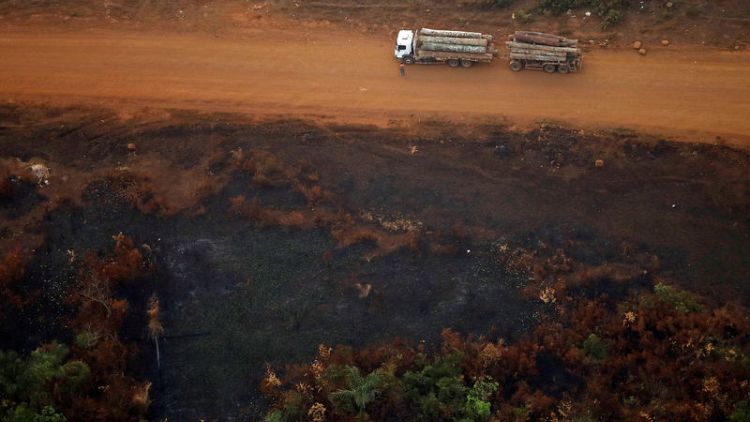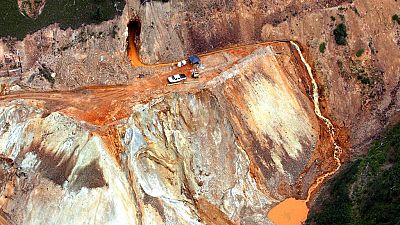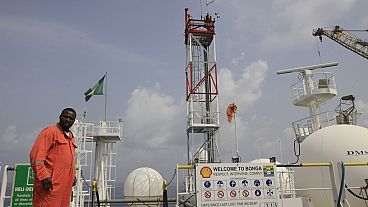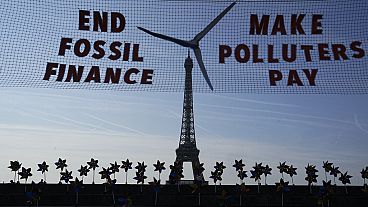By Gabriel Stargardter
RIO DE JANEIRO (Reuters) - Brazil's record-low interest rates and exchange rate threaten to accelerate Amazon deforestation, which has already risen sharply under Brazil's farm-friendly President Jair Bolsonaro, economists tell Reuters.
With Bolsonaro rolling back environmental enforcement and China gobbling up record volumes of Brazil's farm goods, experts say a weak currency and cheaper credit will add to economic forces pushing the agricultural frontier deeper into the Amazon.
Incentives abound to buy land, invest in machinery, plant crops, raise cattle and — experts warn — chop down the Amazon rainforest, one of the major buffers against climate change.
"It's like a perfect storm that has created this free-for-all in the Amazon," said Edward Barbier, an economist studying deforestation at Colorado State University. "I think we're seeing, potentially, (deforestation) spiralling out of control."
Experts agree the main driver of deforestation has been a weakening of environmental enforcement that began around 2012 and has continued under Bolsonaro, who has hobbled the agency charged with protecting the rainforest.
As evidence, they point to the 2004-2012 period, when Brazil cut deforestation by 80% despite high commodity prices.
Brazil's current agribusiness boom has coincided with the election of Bolsonaro, a far-right former army captain who rails against environmental fines and promises new highways through the rainforest.
Top trade partner China, buffeted by a trade war with Washington and a swine fever outbreak, is gorging on the country's meat and grains, while showing little of the environmental concerns of European consumers.
To top it off, Brazil's real currency <BRL=><BRBY> has hit its weakest levels ever in recent weeks, while the central bank is expected to chop interest rates to an all-time low on Wednesday.
"There are multiple scientific studies showing that there is positive correlation between... exchange rate, interest rates, global demand, be it from China or the European Union... and illegal deforestation," said Jan Börner, an economist at the University of Bonn.
The latest data from August 2018 through July 2019 showed more rainforest was cleared than at any point in the past 11 years. Preliminary figures suggest the rate has increased since.
WINNING STREAK
Brazilian agribusiness has grown by leaps and bounds in recent decades as the country has adapted industrial farming techniques to its tropical climate. The sector outgrew the national economy in six of the past eight years.
Farmers' latest lucky streak began in early 2018, when a volatile election began weakening the real, benefiting exports. Since then, as the currency has slid about 25% against the U.S. dollar, the farm sector has played a crucial role in propping up Brazil's stuttering economy.
According to third-quarter economic data released last week, agribusiness grew by 1.3% — more than twice the pace of the broader economy.
Farmers got another lucky break in 2018 when, in response to U.S. President Donald Trump's trade war, Beijing slapped tariffs on U.S. soy. Chinese buyers responded by snapping up cheaper Brazilian soy to feed the country's giant hog herd.
In light of that ravenous demand, Brazilian farmers have pushed for the end of a ban by global traders on buying soy from parts of the Amazon deforested after 2008.
An outbreak of African swine fever in China has raised doubts about the longevity of the soy boom. But it has also helped Brazil's meat exports, as Beijing shores up supplies of chicken, beef and pork.
Brazilian beef production is seen growing by 22% in value next year, the CNA farm lobby said last week, adding that Brazilian agricultural output as a whole will grow 3% in 2020, three times faster than this year.
Although the weak real will make some imported inputs more expensive, private-sector loans for land or equipment purchases have never been cheaper. Brazil's central bank has cut its benchmark interest rate from 14.25% in 2016 to 5.00% currently, as banks step in to replace state-backed farm loans.
Juliano Assunção, an economist at the Pontifical Catholic University of Rio de Janeiro, said that was an ominous sign.
"These market dynamics really impact Amazon deforestation," he said.
(Reporting by Gabriel Stargardter; Editing by Brad Haynes and Dan Grebler)



